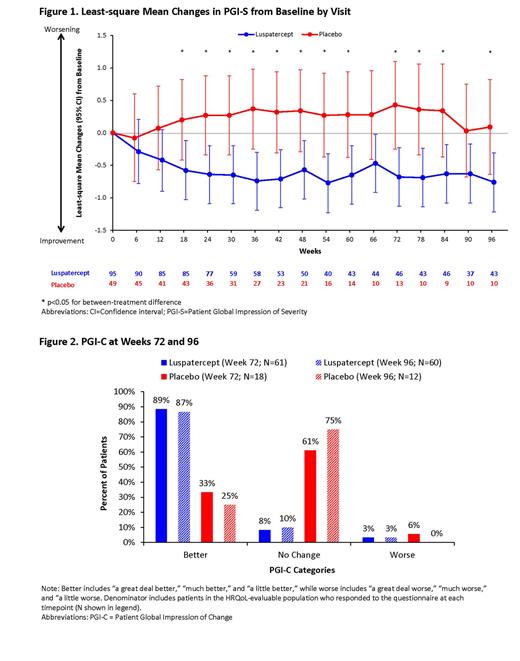Background: Patients with non-transfusion dependent beta-thalassemia (NTDT) suffer from chronic anemia due to ineffective erythropoiesis. The phase 2, randomized, placebo-controlled BEYOND study demonstrated that luspatercept increased hemoglobin (Hb), reduced transfusion burden, and improved NTDT-related symptoms based on the data with 48 weeks of follow-up (Taher A, et al. Lancet Haematol. 2022;9(10):E733).
Objective: The purpose of this analysis was to investigate the long-term effect of luspatercept + best supportive care (BSC) vs placebo + BSC on NTDT-related symptoms through 96 weeks using data collected in the BEYOND study.
Methods: 145 patients with NTDT were randomized 2:1 to luspatercept (Q3W) + BSC or placebo + BSC. BSC included red blood cell (RBC) transfusions and iron chelation therapy as deemed necessary by investigators. Patients completed the NTDT Patient Reported Outcome (NTDT-PRO) and Patient Global Impression of Severity (PGI-S) in a daily electronic diary starting 7 days prior to the first dosing day until Week 24, and thereafter over the 7 days prior to dosing at every other dosing visit. The Patient Global Impression of Change (PGI-C) was administered at every other dosing visit, starting with the first dosing day. The NTDT-PRO consists of 6 questions measuring 2 NTDT anemia-related symptom domains: Tiredness/Weakness (T/W) and Shortness of Breath (SoB), each with a score range of 0 (no symptoms) to 10 (extreme symptoms). The PGI-S asks patients to rate the overall severity of their NTDT-related symptoms (range of 0 to 10, with a higher score indicating greater severity), whereas the PGI-C asks patients to rate the overall change in their NTDT-related symptoms since the start of the study (7-level verbal rating scale ranging from “a great deal better” to “a great deal worse”). Least squares (LS) mean changes from baseline at each visit (up to Week 96) in NTDT-PRO T/W and SoB scores, as well as the PGI-S score, were estimated using a mixed model for repeated measures (MMRM). Responses to the PGI-C were descriptively summarized by treatment group. All analyses were performed in the health-related quality of life (HRQoL)-evaluable population, defined as all randomized patients with a valid QoL assessment and at least 1 post-baseline assessment. All p-values reported from the analyses were nominal.
Results: The HRQoL-evaluable population consisted of 95 of the 96 patients randomized to the luspatercept arm and all 49 patients randomized to the placebo arm. LS mean changes from baseline in both the NTDT-PRO T/W and SoB scores for the luspatercept arm consistently demonstrated greater improvement (i.e., lower scores) than the placebo arm across visits. Improvement in both T/W and SoB domains were more pronounced starting at Week 24 and sustained through Week 96, with differences in LS mean changes from baseline ranging from -0.89 to -0.21 in the T/W domain and from -0.80 to -0.45 in the SoB domain over this time period (both domains on a 0 to 10 scale). Between-treatment differences were significant (p<0.05) at Week 30 (between-treatment difference in LS mean change from baseline, 95% confidence interval: -0.76, -1.42 to -0.10), Week 36 (-0.89, -1.55 to -0.22), and Week 72 (-0.81, -1.54 to -0.09) in the T/W domain and at Week 30 (-0.71, -1.36 to -0.06), Week 48 (-0.77, -1.43 to -0.10), and Week 72 (-0.80, -1.51 to -0.10) in the SoB domain. LS mean changes from baseline in the severity of overall NTDT-related symptoms, assessed by the PGI-S, showed a marked improvement through Week 96 in the luspatercept arm ( Figure 1), whereas patients receiving placebo tended to worsen over time. The between-treatment difference was statistically significant (p<0.05) across most assessment visits from Weeks 18 to 96. For the PGI-C, most patients treated with luspatercept reported “a little better” or more on their overall NTDT-related symptoms at Weeks 72 (89%) and 96 (87%), whereas most patients receiving placebo reported no change at either Week 72 (61%) or 96 (75%) ( Figure 2).
Conclusions: Analysis of the PRO data collected in BEYOND suggests that, in addition to improvements in Hb, patients with NTDT treated with luspatercept experienced durable improvement in NTDT-related symptoms, from a patient perspective, through at least 96 weeks of treatment.
OffLabel Disclosure:
Musallam:Novartis: Consultancy; Bristol Myers Squibb: Consultancy; Agios Pharmaceuticals: Consultancy, Research Funding; CRISPR Therapeutics: Consultancy; Vifor Pharma: Consultancy; Pharmacosmos: Consultancy, Research Funding. Taher:Bristol Myers Squibb (Celgene): Consultancy, Research Funding; Agios: Consultancy, Research Funding; Vifor: Consultancy, Research Funding; Novartis Pharmaceuticals: Consultancy, Research Funding; Pharmacosmos: Consultancy, Research Funding. Kattamis:Agios Pharmaceuticals: Consultancy; Bristol Myers Squib/Celegene: Consultancy, Honoraria, Membership on an entity's Board of Directors or advisory committees, Research Funding; Chiesi: Honoraria; Vertex Pharmaceuticals: Consultancy, Membership on an entity's Board of Directors or advisory committees; Novartis: Consultancy, Honoraria, Research Funding; Amgen: Consultancy; Ionis Pharmaceuticals: Consultancy; Vifor: Consultancy. Lord-Bessen:Bristol Myers Squibb: Current Employment, Current equity holder in publicly-traded company. Glassberg:Bristol Myers Squibb: Current Employment, Current equity holder in publicly-traded company, Research Funding. Pelligra:Evidera, a Thermo Fisher Scientific business: Current Employment. Guo:Evidera Inc.: Current Employment; Bristol Myers Squibb: Consultancy. Felber Medlin:Bristol Myers Squibb: Current Employment, Current holder of stock options in a privately-held company. Moro Bueno:Bristol Myers Squibb: Current Employment, Current holder of stock options in a privately-held company. Kuo:Alexion Pharmaceuticals: Consultancy; Bristol Myers Squibb: Consultancy, Honoraria; Pfizer: Consultancy; Agios Pharmaceuticals: Consultancy, Research Funding; Forma Therapeutics: Consultancy; Vertex Pharmaceuticals: Consultancy; Bioverativ/Sanofi/Sangamo: Membership on an entity's Board of Directors or advisory committees; Novo/Nordisk: Consultancy, Honoraria.
Luspatercept for the treatment of anemia in patients with beta-thalassemia who are non-transfusion dependent.


This feature is available to Subscribers Only
Sign In or Create an Account Close Modal